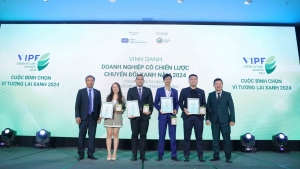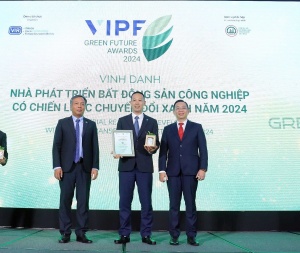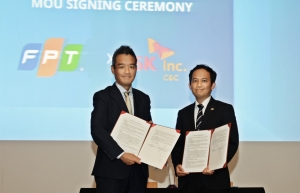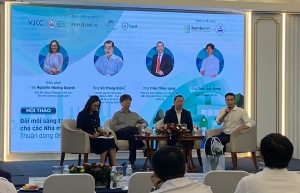Green-digital concepts not yet grasped
At VIR’s talk show themed “Investment Pioneers for the Dual Transformation” held on August 12, representatives of Nestlé Vietnam and AEON Vietnam clarified their strategies to promote rapid and sustainable transformation in both a digital and green direction for businesses.
 |
| A VIR talk show last week delved into issues of green and digital awareness and readiness |
A few days later on August 15-16, in the Mekong Delta city of Can Tho, a training programme was held on enhancing business capacity to adapt to green transformation requirements, reducing emissions, and practising greenhouse gas (GHG) inventory.
The scheme was put together by the United States Agency for International Development, in collaboration with the Agency for Enterprise Development (AED) under the Ministry of Planning and Investment.
The programme aimed to assist Vietnamese enterprises and the Mekong Delta in particular to grasp the overall issues related to GHG emission reduction, and help build strategies to improve development capacity in the direction of sustainability. At the same time, it guided enterprises to be able to initially implement new technical requirements according to domestic and international laws.
According to an annual survey by the AED, many businesses lack a systematic roadmap and are only in the early stages of digital transformation. Only 3 per cent of small- and medium-sized enterprises have advanced to the digitalisation phase, while the rest are still in the process of gradual digitalisation, workforce training, and roadmap planning.
Despite playing an important role in digital and green growth, the reality is that businesses’ awareness of this issue is still limited. Pham Thi Ngoc Thuy, director of the Office of Private Economic Development Research, said, “Only 20 per cent of participants knew about the net-zero commitments made in 2021. Only 10 per cent of businesses know about issues that directly affect them such as carbon tax trends, carbon tax adjustment trends in European countries, developed countries, and related domestic decrees and decisions that need to be implemented immediately.”
Some businesses are still vague about the concept of dual transformation, and confused about how to implement training, coaching, and communication activities on dual transformation, Thuy added.
“In fact, in recent years, although the goals of digital and green transformation have become priorities for most business leaders and governments, these two processes are currently taking place mainly separately, without synchronisation to maximise the potential to increase productivity and efficiency for businesses and economic activities,” said Thuy.
Noting that the dual transformation in Vietnam still faces certain barriers related to budget, people, and technology, FPT Digital general director Tran Huy Bao Giang said, “The budget for dual transformation activities has not been prioritised, while businesses have not yet identified the current situation and do not have a specific transformation strategy. In addition, most employees are familiar with the old way of working, so they are hesitant to accept innovation. And importantly, most of these businesses do not have the infrastructure and data to meet the requirements of digital transformation.”
According to a study by the Global Systems Institute in 2023, big data and cloud computing will consume about 13 per cent of total global electricity by 2030, three times more than in 2018. It believes that this also indirectly causes an increase in carbon emissions and global temperatures.
According to a Statista report published in June, big data and cloud computing account for about 2 per cent of total GHG emissions globally.
Meanwhile, in the era of a green and digital economy, information on the transition from an old to a new economy is urgent. Experts warn that if Vietnam does not quickly have a plan to transition to a green economy, use renewable resources, reduce waste and emissions, and optimise production processes to reduce waste, then the economy will be severely affected and businesses will lose out on more opportunities.
Assoc. Prof. Dr. Vu Minh Khuong, lecturer at the Lee Kuan Yew School of Public Policy under the National University of Singapore Vietnam, said, “If it does not quickly transition to a green growth model, the Vietnamese economy will find it difficult to take off because its competitiveness in attracting investment and exports will decline. The country may lose major trading partners.”
 | Enterprises honoured for green transformation strategies Enterprises with outstanding general green transformation strategies were honoured at the Vietnam Industrial Property Forum on July 30. |
 | Green i-Park honoured for its green transformation strategies Green i-Park, the investor of Lien Ha Thai Industrial Park (Green iP1), has been praised for its green transformation strategies at the Vietnam Industrial Property Forum's special awards event. |
 | IT service providers form green transformation partnership IT service providers FPT IS and SK C&C have formed a strategic partnership to research and develop SK C&C's net-zero factory in Southeast Asia and develop solutions to promote green transformation. |
 | Businesses must act on green transformation Green transformation is urgent for manufacturing businesses to improve competitiveness, attract green investment, and ensure sustainable impacts, according to experts. |
What the stars mean:
★ Poor ★ ★ Promising ★★★ Good ★★★★ Very good ★★★★★ Exceptional
Related Contents
Latest News
More News
- $100 million initiative launched to protect forests and boost rural incomes (January 30, 2026 | 15:18)
- Trung Nam-Sideros River consortium wins bid for LNG venture (January 30, 2026 | 11:16)
- Vietnam moves towards market-based fuel management with E10 rollout (January 30, 2026 | 11:10)
- Envision Energy, REE Group partner on 128MW wind projects (January 30, 2026 | 10:58)
- Vingroup consults on carbon credits for electric vehicle charging network (January 28, 2026 | 11:04)
- Bac Ai Pumped Storage Hydropower Plant to enter peak construction phase (January 27, 2026 | 08:00)
- ASEAN could scale up sustainable aviation fuel by 2050 (January 24, 2026 | 10:19)
- 64,000 hectares of sea allocated for offshore wind surveys (January 22, 2026 | 20:23)
- EVN secures financing for Quang Trach II LNG power plant (January 17, 2026 | 15:55)
- PC1 teams up with DENZAI on regional wind projects (January 16, 2026 | 21:18)

 Tag:
Tag:




















 Mobile Version
Mobile Version